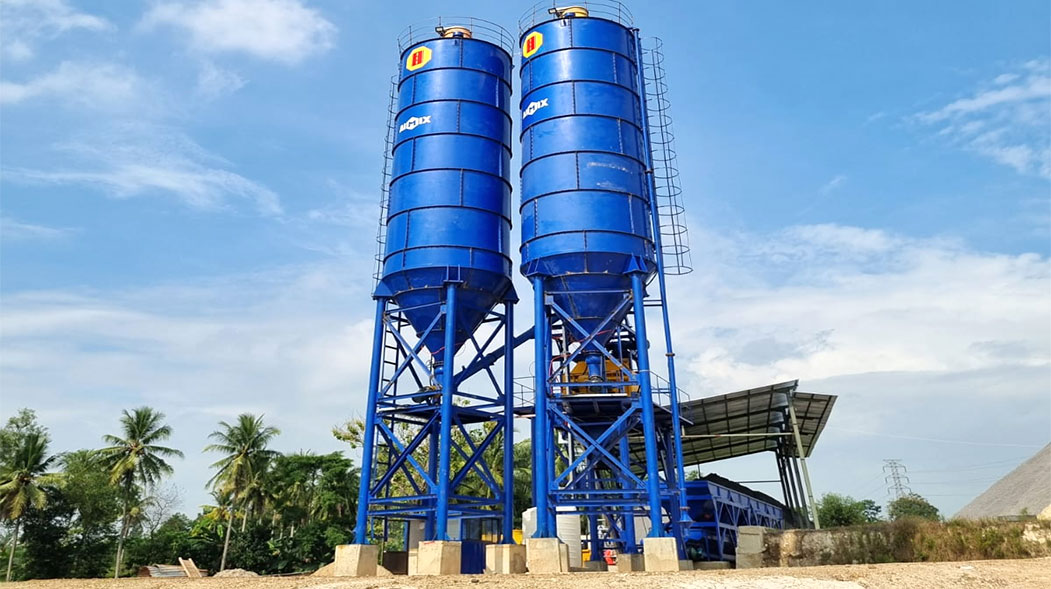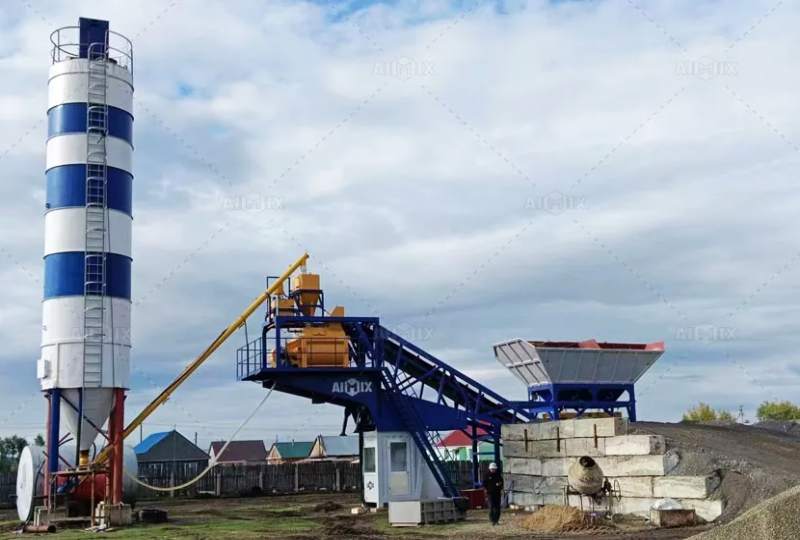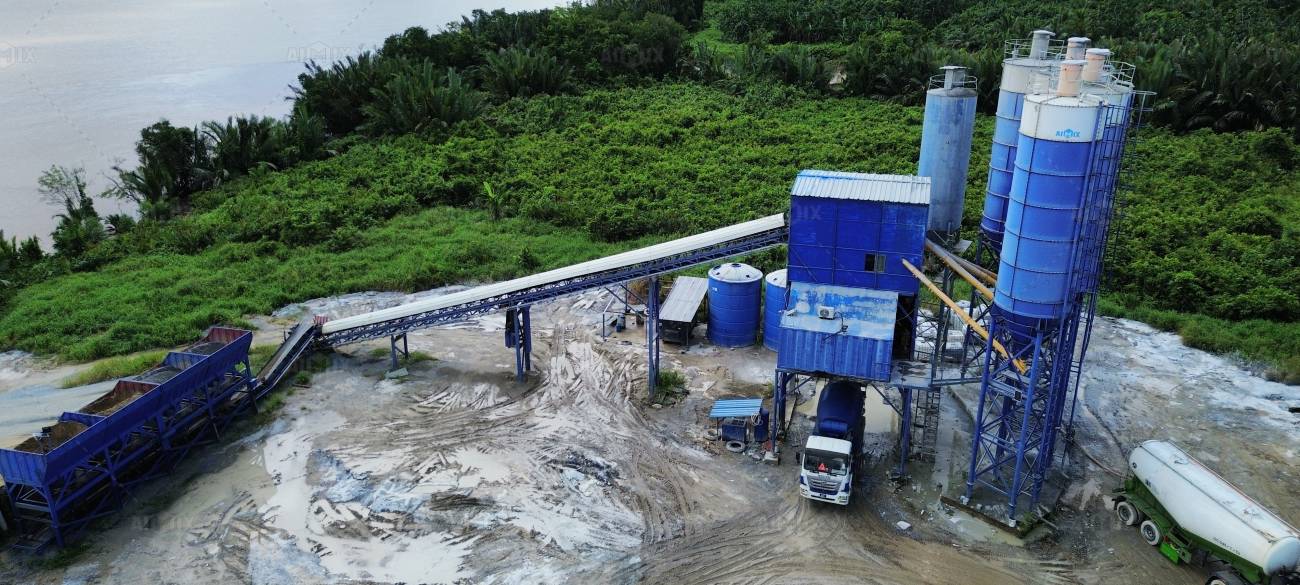In the construction and infrastructure industry, the demand for high-quality concrete is ever-growing. One of the most important pieces of equipment to meet this demand is a batching plant, a facility used for mixing concrete in precise proportions. Whether you’re running a large-scale construction site or starting a new ready-mix concrete (RMC) business, investing in a batching plant can offer significant economic benefits.
The choice between a stationary batching plant, mobile batching plants, or an RMC batching plant depends on several factors, including project scale, budget, and mobility requirements. In this article, we will explore the various economic advantages that come with investing in a batching plant and how different types of plants can impact your operations and profits.

1. Increased Efficiency and Productivity
One of the primary economic benefits of investing in a batching plant is the significant boost in operational efficiency and productivity. Manual mixing of concrete can be time-consuming, labor-intensive, and prone to errors, which can lead to delays and suboptimal mix quality. A batching plant automates the entire mixing process, ensuring:
- Precise measurements for accurate concrete mix designs
- Faster production cycles, leading to quicker turnaround times on projects
- Consistent product quality, reducing the risk of costly mistakes and rework
For projects where large quantities of concrete are required, having an in-house batching plant (whether stationary or mobile) can significantly reduce downtime and increase the overall speed of project execution.
Stationary Batching Plant for Large Projects
A stationary batching plant is a fixed facility often used for large-scale, long-term projects such as road construction, bridges, and large buildings. These plants are designed for high-volume production, ensuring that construction projects proceed without delays. Their large-scale output helps construction companies meet tight deadlines and manage large orders efficiently.
Economic Benefits of Stationary Batching Plants:
High output capacity, which increases the overall project speed
Lower labor costs due to automated mixing processes
Reduced material wastage, ensuring cost-effective use of resources
Mobile Batching Plants for Flexible Operations
For smaller or more transient construction projects, mobile batching plants offer excellent flexibility. These plants can be moved between sites, making them ideal for projects with multiple locations or those requiring flexibility in production.
Economic Benefits of Mobile Batching Plants:
On-site production, eliminating the cost of transporting ready-mix concrete
Faster setup times, enabling contractors to begin work quickly
Reduced transportation costs, particularly for small-to-medium-scale projects

2. Cost Savings on Material Handling and Transportation
Concrete is often a major cost driver in construction projects. When concrete must be transported from a central plant to a remote job site, costs can skyrocket due to fuel, labor, and logistical challenges. By having a batching plant on-site, whether stationary or mobile, these expenses are minimized, leading to significant cost savings.
- On-site mixing means you no longer need to rely on external suppliers for concrete delivery, saving on transportation costs.
- Reduced material waste occurs when the concrete is mixed according to exact project requirements, eliminating the risk of over-ordering or under-ordering concrete.
RMC Batching Plants and Reduced Transportation Costs
RMC (Ready Mix Concrete) batching plants are highly cost-effective for large-scale operations requiring consistent concrete supply. These plants allow companies to produce concrete in bulk quantities and deliver it directly to various job sites. As a result, the expenses tied to transportation and delays in concrete delivery are drastically reduced, which is particularly beneficial in urban areas where road access and transportation can be challenging.
Economic Benefits of RMC Batching Plants:
Bulk concrete production at lower per-unit costs
Direct delivery to the job site, reducing transport delays
Reduced carbon footprint due to less transportation demand
3. Long-Term Investment and Increased Profit Margins
While the initial investment in a batching plant may be significant, the long-term financial benefits can be substantial. Purchasing a batching plant is considered a capital investment that delivers continuous returns. Over time, the cost savings generated by in-house concrete production offset the initial cost of the plant, resulting in increased profit margins.
- No dependency on third-party suppliers: Companies that own a batching plant don’t have to rely on external ready-mix suppliers, allowing them to control production and pricing.
- Improved cost control: With an in-house batching plant, businesses can monitor and control the quality and cost of raw materials, further optimizing their budget.
- Increased capacity: As projects grow and more concrete is required, having a batching plant on-site allows you to scale operations efficiently.
Stationary vs. Mobile Batching Plants for Long-Term Profitability
The choice between a stationary batching plant and a mobile batching plant depends on project requirements and the expected duration of operations. A stationary batching plant is a better option for long-term profitability, as its higher capacity and stable production yield greater returns for large-scale projects.
Conversely, a mobile batching plant is more profitable for businesses involved in short-term or small-to-medium-scale projects. The ability to move the plant between locations allows companies to stay competitive without investing in multiple stationary plants.

4. Flexibility and Scalability for Expanding Operations
A batching plant provides excellent flexibility, particularly if you’re considering expanding your construction operations or diversifying into new markets. Mobile batching plants, in particular, allow companies to scale operations without the need to invest in new fixed infrastructure. This adaptability makes it easier for businesses to respond to fluctuating market demands.
For example, a company that owns a stationary batching plant can produce large quantities of concrete in response to increased demand in specific projects. Meanwhile, a mobile batching plant offers scalability by enabling companies to serve various job sites without investing in new, expensive fixed equipment.
Adapting to Changing Markets with RMC Batching Plants
The flexibility of an RMC batching plant helps businesses adapt to changing market conditions by enabling on-demand production. With the ability to mix and supply concrete as needed, RMC batching plants provide a competitive edge in a fast-paced industry.
5. Environmental Benefits and Cost Reduction
Sustainability is a major focus in the construction industry, and owning a batching plant helps businesses reduce their environmental impact while lowering costs. For example, batching plants allow for precise material handling, which minimizes wastage and reduces the carbon footprint.
- Less material wastage: Proper control over the mixing process ensures that the right amount of concrete is produced, eliminating overproduction.
- Energy-efficient designs: Modern batching plants are designed with energy efficiency in mind, reducing power consumption and lowering operating costs.
RMC Batching Plants and Sustainable Practices
By reducing transportation and ensuring consistent quality, RMC batching plants contribute to the sustainability of a project. This minimizes waste, promotes responsible resource usage, and reduces emissions associated with concrete transportation.
Conclusion
Investing in a batching plant offers significant economic benefits, from increased productivity and reduced transportation costs to long-term profit margins and environmental advantages. Whether you opt for a stationary batching plant, mobile batching plants, or an RMC batching plant, each type of plant offers unique advantages for businesses involved in construction and infrastructure projects.
For companies looking to scale their operations, improve cost-efficiency, and ensure consistent concrete supply, investing in a batching plant is a strategic decision that will pay dividends for years to come.